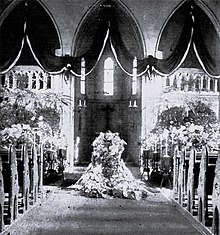Edvard Hjelt
Edvard Immanuel Hjelt (born June 18, 1855 in Vihti , † July 2, 1921 in Bad Mergentheim ) was a Finnish chemist , diplomat and politician .
Studies and academic career
Hjelt graduated in chemistry at the University of Helsinki . As was customary at the time, he completed his training with stays abroad, especially in Germany. After his second stay in 1877 and 1878, first with Johannes Wislicenus in Würzburg and later with Emil Fischer , Emil Erlenmeyer and Adolf von Baeyer at the University of Munich , he received his doctorate on his return. After a second stay at the University of Strasbourg with Rudolph Fittig , he was qualified to teach and became professor of chemistry at the University of Helsinki in place of his mentor Johan Jacob Chydenius (1836–1890).
In the period that followed, Hjelt wrote a number of textbooks on organic chemistry, which were standard works until the 1930s. In 1916 he published the history of organic chemistry from the earliest times to the present . Hjelt also wrote many obituaries for deceased colleagues, for example for Jean-Baptiste Dumas or Friedrich Konrad Beilstein .
From 1899 to 1908 he was rector of Helsinki University three times in a row. In this context he also felt the increasing pressure on the Grand Duchy of Finland to draw closer to Russia, to which the Grand Duchy actually belonged at that time.
Political career
Political activities up to the Finnish Civil War
Hjelt was also a senator in the Grand Duchy of Finland from 1899 to 1917. After the Landtag lost most of its powers in 1899, a Russification began, which was strongly felt both in the political system and in the universities. Hjelt tried to keep the situation calm and to stop the Russification as much as possible. The formation of a hunter battalion in 1915 made up of Finnish volunteers who were trained in Germany can also be traced back to his initiative. The good knowledge of German and his close relations with Germany helped him to get this support from the highest authorities in the German Empire . This hunter battalion became the core of the Finnish army in the struggle for independence in 1918. Hjelt became the Finnish envoy in Berlin and had close contact with General Erich Ludendorff and General Field Marshal Paul von Hindenburg . The landing of six German battalions in Finland in March 1918 was also his initiative.
Monarchy and republic
Hjelt was also involved in selecting a suitable king for the new constitutional monarchy of Finland. The first favored by him Duke Adolf Friedrich von Mecklenburg-Schwerin was not supported by Prussia and so Friedrich Karl von Hessen was proposed as a candidate. Through the influence of the Allies, Kaarlo Juho Ståhlberg became the first President of Finland without a king ever having been crowned.
Before the transfer of the deceased , a funeral service took place in Lübeck on July 8, 1921 in the castle chapel . Representatives of the Senate and many authorities, the consuls of the Nordic empires and representatives of large companies took part in this.
Pastor Johannes Pautke von St. Marien and the State Secretary for Foreign Affairs ( Foreign Minister ) a. D. , Paul von Hintze , thought about this with words.
The next day the steamer “ Poseidon ” brought the tireless champion of Finland's freedom from Russia and friend of the Germans home.
Honors
In May 1918 he was made an honorary member of the German Chemical Society .
Works
-
History of organic chemistry from the earliest times to the present: with 3 figures . Braunschweig: Friedr. Vieweg & Son, 1916.
- Reprint from Springer doi: 10.1007 / 978-3-663-07241-6 ( PDF )
- Digital edition of the University and State Library Düsseldorf
- From Jac. Berzelius 'and Gustav Magnus' correspondence in the years 1828-1847 . Braunschweig, 1900.
Biographical sources and background information
- George B. Kauffman , Lauri Niinistö: Edvard Immanuel Hjelt (1855-1921): Finnish Chemist and Historian of Chemistry . In: The Chemical Educator . 3, No. 3, 1998, pp. 1-15. doi : 10.1007 / s00897980208a .
- George B. Kauffman, Lauri Niinistö: Chemistry and Politics: Edvard Immanuel Hjelt (1855–1921) . In: The Chemical Educator . 3, No. 5, 1998, pp. 1-15. doi : 10.1007 / s00897980247a .
Web links
Individual evidence
- ^ Funeral service for a friend of Germany, the Finnish State Councilor Dr. Edvard Hjelt. In: Vaterländische Blätter , No. 22, year 1920/21, edition of July 17, 1921, p. 86.
| personal data | |
|---|---|
| SURNAME | Hjelt, Edvard |
| ALTERNATIVE NAMES | Hjelt, Edvard Immanuel |
| BRIEF DESCRIPTION | Finnish politician |
| DATE OF BIRTH | June 18, 1855 |
| PLACE OF BIRTH | Vihti |
| DATE OF DEATH | July 2, 1921 |
| Place of death | Bad Mergentheim |

